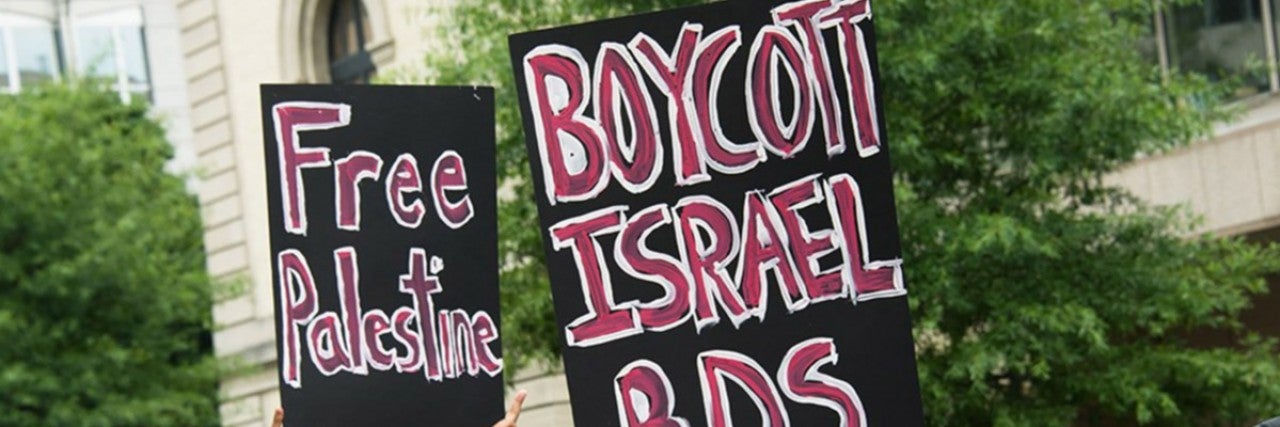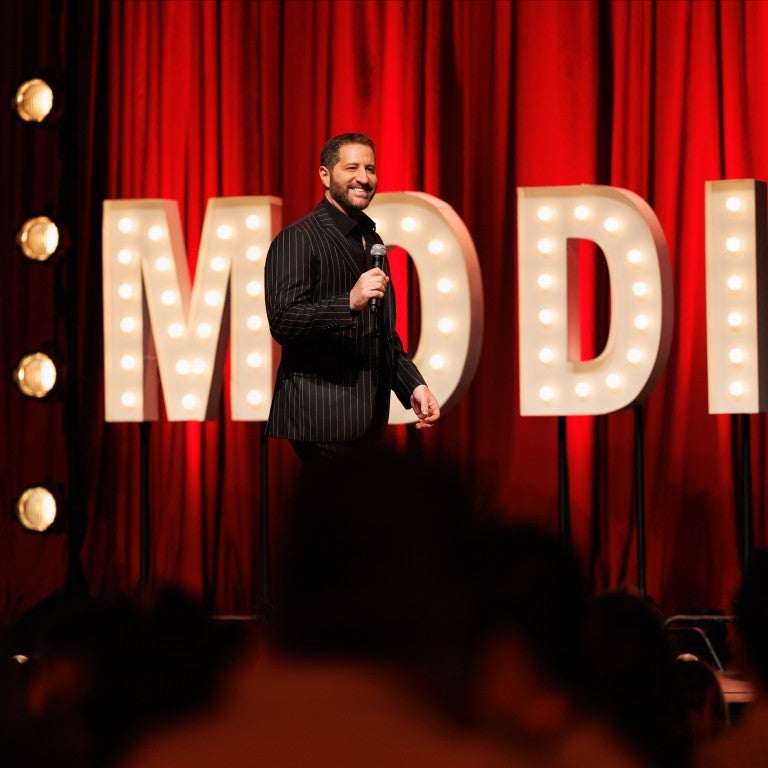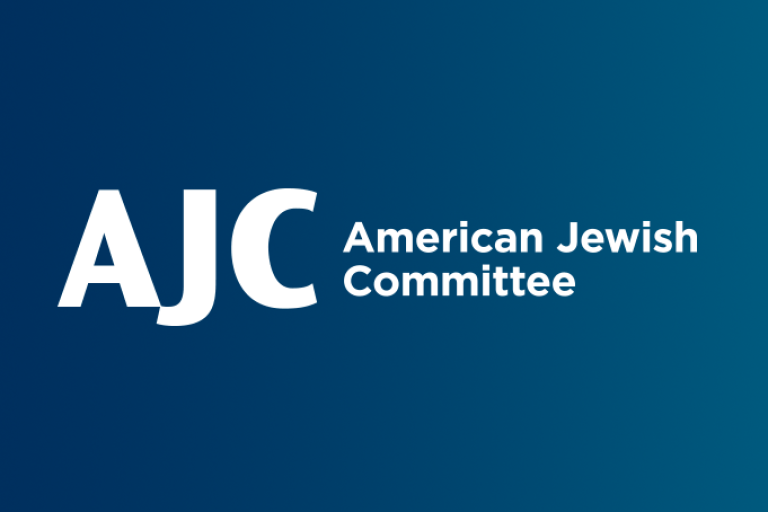February 4, 2021
A controversial curriculum for teaching ethnic studies in California public schools will face a final vote in March. Since the first draft came out in 2019, a coalition of Jewish organizations has advocated for content that meaningfully includes Jews and other groups, discusses antisemitism, and avoids perpetuating stereotypes that put Jews in danger. We sit down with Director of AJC Northern California Rabbi Serena Eisenberg about the curriculum and why it should matter to all of us.
Then, on Shabbat Table Talk, AJC’s Chief Field Operations Officer Melanie Maron Pell joins us to speak about AJC’s Mayors United Against Antisemitism initiative, Manya Brachear Pashman on why she isn’t laughing at the Representative Marjorie Taylor Greene (R-GA) jokes, and Seffi Kogen on antisemitism on college campuses.
Listen to this episode on Apple Podcasts, Spotify, and Google Podcasts.
Episode Lineup:
- (00:40) Rabbi Serena Eisenberg
- (23:17) Melanie Maron Pell
- (26:48) Manya Brachear Pashman
- (29:29) Seffi Kogen
Show Notes:
We need your help before California’s Ethnic Studies Model Curriculum is finalized. Click here to act now.
Mayors United Against Antisemitism
Seffi Kogen’s Op-Ed in Inside Higher Ed
AJC Arabic video - Protocols of the Elders of Zion
Episode Transcript
Manya Brachear Pashman (0:28)
A controversial curriculum for teaching ethnic studies in California's public schools will face a final vote in March. Since the first draft of the curriculum came out in 2019, a coalition of Jewish organizations, including the American Jewish Committee's California team, has worked together to fine tune the content to be more inclusive, define antisemitism and avoid perpetuating the stereotypes that put Jews in danger. Here to talk about the debate surrounding the California curriculum and why it matters to all of us is Rabbi Serena Eisenberg, Director of AJC Northern California. Serena Eisenberg, welcome to People of the Pod.
Serena Eisenberg (1:15)
Thank you for having me.
Manya Brachear Pashman (1:16)
So exactly what is California's ethnic studies curriculum?
Serena Eisenberg (1:21)
A start back in 2016 when the California state legislators passed a law mandating that the State Department of Education develop a guidance document for the teachers and administrators so they could implement ethnic studies courses in public schools. And the reason was because in California, students of color account for the majority of the population in our public schools. They speak about 90 different languages. So the goal was to prepare pupils to be global citizens with an appreciation for the contributions of multiple cultures. AJC supported that effort. We believe that K-12 students across California should be able to learn the role of ethnicity, race, and religion in the life of all of the citizens, including, maybe even especially, those groups that have been largely left out of other textbooks. And so high-quality ethnic studies courses can help combat bigotry, heal some of the really difficult racial and ethnic divisions we are facing in this country. So whereas we support an inclusive and balanced approach to ethnic studies, what some might call multicultural or constructive ethnic studies, which focuses on the contributions and challenges of a broad array of ethnic cultures, what happened with the California curriculum was that the State Department of Education appointed a small advisory committee of teachers who are committed to something called critical ethnic studies. The Critical Ethnic Studies Association was formed in 2011, with a specific goal of radical resistance. It was anti-capitalist, anti-imperialist, somewhat Neo Marxist ideology, and this group was what guided the development of the very controversial first draft of the curriculum, which was released in 2019.
Manya Brachear Pashman (3:12)
What was controversial about that first draft?
Serena Eisenberg (3:15)
The first problem was that it lacked balance running through the entire curriculum. The goal was promoting this narrow, critical ethnic studies ideology. The Los Angeles Times editorial board wrote that the curriculum talks about critical thinking, but usually offers one side and one side only. It's more about imposing predigested political views on students than about widening their perspectives. That was the Los Angeles editorial board. So a second problem was that it wasn't inclusive. We talked about more multicultural approach which looks at the diversity of all of our California population, but this curriculum actually left out a lot of groups including Sikhs, Hindus, Koreans, Syrians, Armenians, Jewish Americans. It had a very small focus on particular groups. And because of that AJC formed a multi-ethnic coalition with a number of other ethnic groups to ask for a more inclusive curriculum. One, lacked balance, two, not inclusive, but three, and I think this is what was so outrageous, it really contained a lot of offensive material. There are some examples of antisemitic material, BDS material, and even more so material that wasn't even included, for example, a really extensive glossary in a curriculum that's designed to combat discrimination didn't include a definition of antisemitism. This was released just after the shooting in Poway, so the Jewish community was particularly eager to see that antisemitism was going to be taught about in an ethnic studies curriculum for California.
Manya Brachear Pashman (4:48)
Was there any kind of explanation as to why antisemitism was left out of the first draft?
Serena Eisenberg (4:55)
This paradigm of critical ethnic studies sees the world through a lens of people of color and whites, oppressed and oppressors, and in that paradigm, Jews are considered to be white. And of course, we know Jews have a complicated identity. Many Jews of color, many Jews, Mizrahi or Middle Eastern origin, huge number of Persian Jews in California. And so, unfortunately, the curriculum just considered Jews as whites, and focused only on four groups of people of color. That would be African Americans, Latinos, Native Americans, and Asian Americans.
Manya Brachear Pashman (5:34)
These complaints when you pointed out these flaws led to a second draft. So when was that second draft released? And what were the flaws in that iteration?
Eisenberg (5:44)
In the second version, we still saw that the whole curriculum was being guided by values and principles of the critical ethnic studies movement. And these come from a book called Rethinking Ethnic Studies by a scholar named Cuauhtin. And they set as the goals of teachers for their lessons in the classroom, that students will challenge imperialist, colonialist belief that they'll build new possibilities for post-racist, post-systemic racism society, that promotes collective narratives of transformative resistance. Again, it's a relatively radical goal, and this would link to every single lesson plan in the curriculum. Now, the second draft, we have done a lot of advocacy to make sure that a Los Angeles ethnic studies curriculum, which had a more balanced approach, there would be additional language that would be added from that. So the Jewish community was bothered because it still didn't contain lesson plans about antisemitism, a definition of antisemitism, more positive experiences of the Jewish community, but rather focused on this narrow idea that Jews have gained white privilege. That was a very problematic way to present Jews as the only place they were represented in the curriculum.
Manya Brachear Pashman (6:58)
When did AJC first find out that there was going to even be an ethnic studies curriculum and was AJC or any other Jewish organization or scholar consulted in the formation of the curriculum at any stage?
Serena Eisenberg (7:13)
In 2016, the Jewish community knew about the law to mandate the creation of the curriculum. What happened was when the California Department of Education appointed this advisory committee, that did not contain Jewish representation. And then when they finally released the first draft, it was really buried, couple sections deep into their website. And even though it was open for public comment, it was really just a couple of activists who were able to dive in, understand the implications, and share with several of us in the Jewish community, ringing the alarm bell, and immediately there were two weeks left where people could provide public comments. We sent out action alerts, and flooded California Department of Education with comments criticizing that first draft.
Manya Brachear Pashman (8:01)
And then AJC has become much more involved, as you said, advocating for the inclusion and has succeeded.
Serena Eisenberg (8:09)
One thing that's important to realize is that even though the third draft is much improved, we all have put in specific line by line revisions because there are many flaws with the third draft still, and we're hoping that those revisions will be considered before the state board approves the final version. In the meantime, opponents, those who are in favor of the first draft of the curriculum, the critical ethnic studies activists, formed a movement called "save California ethnic studies." And what they decided to do is go to local school boards across the state and ask them to pass a resolution endorsing the first draft of the curriculum. And school boards are able to determine which version of ethnic studies they will implement in their districts. And so we still believe that even after the third version is adopted, we'll need to remain vigilant because at the local level, trying to understand what teachers are going to actually be presenting to students in the classroom is important, and we still know that there's an overarching and strong, ideological driven nature of this field.
Manya Brachear Pashman (9:18)
We're talking about a California curriculum here. So why do we care so much about this curriculum? Why do our listeners in St. Paul, Minnesota, or Lincoln, Nebraska, Raleigh, North Carolina, why should they be concerned?
Serena Eisenberg (9:35)
California is the largest school system in the country with 6 million students. Texas is next with 5 million, and New York has less than 3 million. California is a model for other states. We are seeing legislation and curriculum for ethnic studies in states like Washington, Massachusetts, Connecticut, and we know that the National Education Association (NEA), the teachers union of 3 million teachers, have endorsed ethnic studies. And so we are seeing this pop up across the country. You know, I started as the Hillel director at Brown University in 2005, and then I worked as the director at Stanford until 2017. And in that interim, we saw the organized growth of the BDS movement, gaining sophistication across college campuses. And we looked at this critical ethnic studies movement as a clear indication that K-12 public schools are the intended next landscape. That's another reason why viewers or listeners should be concerned. There's other reasons. There's reasons for all Americans, not just the Jewish community. School districts are spending tens of millions of dollars to develop this curriculum at a budget crunch time. Huge school issues contending with remote learning during COVID. And then they'll need to train teachers and implement these new courses. A study just came out from AMCHA which was fascinating because there's actually a debate about whether or not ethnic studies even benefits students, either academically or socially. And, of course, by law, curriculum and materials that are promoted in the classroom actually have to be research based. Actually have to promote the academic achievements of students. And there's also some evidence that this kind of curriculum can harm students, that can actually be divisive.
Manya Brachear Pashman (11:20)
As our nation grapples with this racial reckoning, is there a constructive or responsible way to teach about the phenomenon of white privilege in the proper context? Or are you saying that that's the wrong approach altogether?
Serena Eisenberg (11:38)
It's so important for us to grapple with issues of racial injustice. And it's very sensitive at this moment to claim that we shouldn't be teaching about these important issues if they will truly combat racism and discrimination and bigotry, which we are all in favor of. I think that's why our fight has been so complicated and prolonged. We want to get it right. You have to be very cautious. Teachers have to be well trained. It really does have dangerous repercussions for Jewish students in particular who can become a target when they are the only one seen as being white and privileged, and that stereotype has led to such genocidal implications for the Jewish community.
Manya Brachear Pashman (12:21)
If listeners do want to have some input in this, what can they do?
Serena Eisenberg (12:26)
Couple different things. One is the state board of education will still be taking comments even though the public comment period officially closed. They will not endorse this until March. So AJC has an action alert up on our website and we encourage people still to sign on to that letter. And that way, you'll also stay informed about AJC's advocacy in this area. But another thing, and probably the most important thing, is to pay attention to your local school district. Whether it's public school or even private schools and charter schools, get involved. Try to understand what kids are learning about this subject because again, we are seeing this in many ways across the country, and we would love for you to be our eyes and ears so that we can remain vigilant.
Manya Brachear Pashman (13:10)
Serena, thank you so much. This is indeed a very complicated topic. Thank you for breaking it down for us and helping our listeners understand.
Serena Eisenberg (13:18)
Thank you.
Seffi Kogen (13:25)
Now it's time for our closing segment Shabbat Table Talk. And joining us at our Shabbat table this week is Melanie Maron Pell, AJC's Chief Field Operations Officer. Melanie, when you're talking with your family at your Shabbat table this weekend, what are you going to be talking about?
Melanie Maron Pell (13:38)
Thanks, Seffi. This Shabbat we will be talking about one of my favorite subjects, something I talk about all of the time, and that is mayors. Last week on International Holocaust Remembrance Day, in partnership with the US Conference of Mayors, AJC relaunched our Mayors United Against Antisemitism initiative, which calls on mayors from across the United States to add their names to a statement condemning antisemitism in all of its forms, and affirming that antisemitism is not only an attack on Jews, but an assault on the core values of any democratic and pluralistic society.
I am very excited to share that in just over one week, we have now nearly 200 mayors signed on from 38 states plus the District of Columbia, representing more than 46 million Americans. Over the past five or six years, I've had the really great fortune of helping AJC build a relationship with the US Conference of Mayors, which has resulted in an exciting partnership. I've attended a number of US Conference meetings and gatherings, including their 2021 virtual winter meeting, which just convened just two weeks ago. And in non-pandemic years, I have traveled with delegations of mayors that we've taken to Israel through AJC's Project Interchange, which have included so many amazing leaders including the likes of Pete Buttigieg, the former mayor of South Bend, who just yesterday was sworn in as Secretary of Transportation. So in these meetings and on these trips, I've gotten to know a number of mayors quite well.
Here's why I'm such a huge fan. Mayors are frontline first responders, whether it's COVID vaccine distribution, addressing racial tensions, police reform, economic recovery, community health, education, immigration, climate, you name it, mayors are on the front lines. And they confront these very real, very urgent issues every single day and are in tune with community needs and realities. Mayors are also accountable. They have a level of accountability as a result of being part of the fabric of daily life in their communities. They're not in DC, they're not at the state capitol, they're at the grocery store, or they're out walking their dogs. And if that pothole doesn't get filled, or the snow isn't plowed, or the garbage isn't picked up, you better believe the mayor is going to hear about it. And people may not know who their state representative or state senator is, but there's a very high probability they know who their mayor is, and they are interested in holding that Mayor accountable. The other thing I love about mayors is that and I'm generalizing here, but in general mayors are non-ideological, they need to find solutions. They have to be problem solvers and are always looking for the best ideas. They don't care if the great idea comes from a Republican or a Democrat. They want to know, is it effective? Is it efficient? Can it help people? Yes, many of them are partisan in the sense that they are proud Democrats or proud Republicans, but they don't have that luxury of ideological purity or of merely opining on a soapbox, because they have to get things done.
Another thing I love is that mayors are innovators. They are data driven. And they're asking questions about how can data lead to more efficient delivery of services from everything from trash pickup to police response times to COVID vaccine delivery, you can imagine how exciting it is for mayors to see Israel and experience Israeli innovation. And that's why in our Mayors United Against Antisemitism initiative, we highlight that data that shows that the largest percentage of religious based hate crimes are perpetrated against Jews. And then finally, moral leadership when terrible things happen or when natural disasters like tornadoes or hurricanes or human made disasters like mass shootings or violent racist or antisemitic incidents occur, people look to the mayor for leadership and moral clarity and reassurance. On one of our Israel trips, we were in Yad Vashem, the world Holocaust Remembrance center in Jerusalem. And the mayors were profoundly impacted to learn how the complicit mayors in Germany played a role in allowing their Jewish communities to be deported and killed. They understand that the role of local leadership was integral, and it was a reminder to them that they have a responsibility to be a moral voice to their communities. So when mayors individually and collectively pledged to condemn and reject antisemitism in all of its many manifestations, it sends a powerful message that these frontline leaders from Pittsburgh to Poway from Los Angeles to Miami are willing to name antisemitism to define it and to combat it. And I think it's exciting and worth talking about during Shabbat. And if anyone is interested in reading the full statement or seeing the full list of signatories, we have it at AJC.org/mayors.
Manya Brachear Pashman (18:15)
Thank you, Melanie. It's true. We all know our mayors we don't necessarily know our senators or state representatives or Congress members, but we do know one and she's from Georgia. At our Shabbat table we will be talking about lasers laughter and MTG. No, not Magic the Gathering. Marjorie Taylor Green. Now I'm sure everyone knows what I'm referring to the troubling Facebook comments posted by Congresswoman Green back in 2018, blaming the California wildfires on space lasers owned by the Rothschild family. Jews on Twitter had a field day with this, pointing out how useful such a laser would be for toasting bagels. Cecily Strong on Saturday Night Live lampooned the Congresswoman, speaking in an exaggerated southern drawl about the laser and the conspiracy theory, that the children and recent school shootings were dolls. Green has in the past embraced the antisemitic conspiracy theories of QAnon, which in many ways echo the century old Protocols of the Elders of Zion, a fabricated text that alleges a secret conspiracy by a group of powerful Jews to control the world. Now as part of its Arabic outreach to combat antisemitism in the Middle East, AJC just released a short film in Arabic, debunking the conspiracies behind Protocols. You can find a link to the English translation in our show notes. Perhaps someone should send a link to the Congresswoman.
Now, I love to laugh. And I believe if we abandon our sense of humor, now, we're done for. So of course, I laughed at the SNL sketch, and I enjoyed scrolling through the Twitter memes like everyone else. But when Monday came, and there was still no public apology, or retraction, or consequence, my laughter faded, and I got really worried. The Congresswoman apparently expressed remorse for her comments privately, but this is a woman in Congress. She was elected by a majority of voters in her district. She's a public servant. And the public has not heard her explain any of the views she's expressed, and whether they will inform her policymaking. Then again, she has journalists tossed from her events. So how could the public know what she's really saying? Or hold her accountable? Lasers, laughter, and leadership. That's what we'll be talking about at our Shabbat table this week. Seffi?
Seffi Kogen (20:27)
This week, I had an Op-ed printed in a publication I'd never written in before: Inside Higher Ed. Inside Higher Ed is one of the leading outlets for news and views related to higher education policy. So it was the ideal venue for this Op-ed, which was titled "It's Time We Taught Antisemitism". In the AJC State of Antisemitism in America report, our polling firm found that more than half of Americans 18 to 29 years old, on other words, the cohort, most widely represented among college students and recent graduates, said that they didn't know the meaning of the word antisemitism.
It wasn't a trick question, we simply asked them: How familiar are you with the term antisemitism? A little less than a third, 30%, said that they had heard the term but we're not sure what it meant, and 23% more, nearly a quarter said that they had never even heard the word. Meanwhile, over in our parallel survey of American Jews, a shocking 41% in the same age cohort, that same 18 to 29 year old group, but this time of American Jews instead of all Americans, said that they had been the target of an antisemitic attack or remark. That's the highest number we found in any age group we surveyed. As many as 82% of those young American Jews said that they felt that antisemitism in America had increased over the past five years. The survey findings suggest that these young Jews have a point when we asked their non-Jewish peers if it was antisemitic to say, the US government only supports Israel because of Jewish money, 32% said it wasn't. When we asked them if the statement, American Jews are more loyal to Israel than to America, if that statement was antisemitic, 39% said it wasn't. And we asked them about the statement, Israel has no right to exist, 26% of young Americans aged 18 to 29 years old said that that was not antisemitic.
Now look, I have no doubt that if you ask young Americans, whether they hate Jews, the overwhelming majority would say that they do not. But a majority of them do not know what antisemitism is, and many can't even recognize it when it's staring them in the face. With that problem in mind, I wrote about three concrete steps that colleges and universities should take to combat this rising problem. I hope you'll check out the article to see those steps and we'll link to it in our show notes and it's available on ajc.org or on insidehighered.com and I hope that you'll read it and share it widely. I promise it's worth discussing at your Shabbat table. Shabbat shalom.
Manya Brachear Pashman (23:12)
Shabbat shalom.
Melanie Maron Pell (23:13)
Shabbat shalom.





